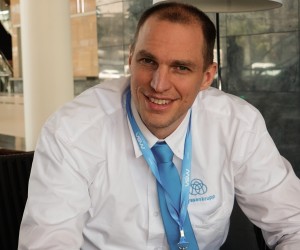Mining has the potential to help uplift the underperforming economies of Africa by unlocking the full potential of its rich resources from a mineral, skills development, efficiency and technology perspective
One of the key players to take the industry forward on the African continent has been thyssenkrupp, which is one of the world’s leading companies in the field of international heavy plant engineering, and it plans on making an impact on the African economic renaissance.
Operating from South Africa with a workforce of over 400 specialists, their solutions encompass the entire range of services for fertiliser, petrochemical, oil and gas, electrolysis, mining, minerals and cement and lime projects. Their vast experience spans over five decades, with an impressive reference list that extends throughout sub-Saharan Africa and with many cutting-edge innovations being released in the marketplace.
A company with a history that spans over 100 years, thyssenkrupp is the result of a merger between two German steel companies, Thyssen AG, founded in 1891 under the name Gewerkschaft Deutscher Kaiser, and Krupp, founded in 1811. In 1997, the companies combined their flat steel activities, with the full merger completed in March 1999
To find out more about this advanced company, their industrial solutions and their new leader for sub-Saharan Africa, Gregory Simpson had an audience with the influential new, CEO Philipp Nellessen, at the Mining Indaba earlier this year.
Innovation has always been a foundation of your company’s rich history globally, has there always been that edge that sets you apart from the competition?
Yes. That is our DNA. We have 21 000 engineers worldwide and to me, it’s always amazing if you put that number of engineers together—you automatically get innovations. It seems to me it’s coded in engineers’ minds and that’s also part of the role we play here in South Africa. For example, we have the Redox flow battery, which is part of our latest and greatest technology invention.
We showed ‘carbon to chem’ where we take exhaust gasses, like CO2, and transfer them back to chemicals. It’s state of the art, we are setting up pilot plants this year.
Can you tell us a little bit more about the Redox battery? It sounds like groundbreaking technology.
It is a groundbreaking technology. Energy is definitely one of our key problems for the future, how do we get our energy? We can’t go on burning fossil fuels forever and nuclear energy has its limitations as well. It’s clear we have to get more renewable energy. With renewable energies, you always have the problem, it’s produced when you don’t need it and it’s not produced when you need it. All current battery concepts that are out on the market have limitations, first, in terms of capacity and secondly, in terms of usage, so we all know the battery just goes down and down.
What we put together now with the Redox flow battery is a battery that has three main advantages—first, it’s not limited to any capacity, you can start one megawatt, 10 megawatts, 100 megawatts or whatever you need it for. The second advantage is it is a battery that has a reactor that is the same with the energy that is produced and the storage is completely separate. So this year, you install a one-megawatt battery and next year, say you actually need five megawatts, you just add. It’s a completely new battery concept. It’s essentially a chemical reaction taking place, which produces a loaded chemical liquid and then that reaction can also be reversed to release the energy again.
Is it kinder on the environment than the traditional batteries?
Yes, it definitely is because these batteries can run for thirty, forty, fifty years, just once in a while, you clean the liquid. It’s not like a usual battery that you throw away, this one can go forever.
Germany is a leader in renewable energy. What’s the biggest lesson South Africa can learn from your experience?
It is about that energy storage because if you opt for renewable energy, it’s the right move, however, you need to have a plan for that. In Germany, we build a tremendous number of windmills. Right now, when there’s a storm, most of them are switched off because the grid cannot take the energy. You need to take that into account when designing your grid—seeing how much additional capacity you need to recover from the times when the wind is not blowing. In Germany, we are sometimes in a mode where we get money if we take energy over the holidays (when industry stops), because the grid is so clean. That was not calculated in the investment cases when they put up these windmills. You need to be a little bit careful of that but it is the right way to go, there’s no doubt about it.
Where are your growth areas in Africa as you expand the business?
We do have a couple of growth areas. For me, part of why we are here is really to develop the African continent by bringing state-of-the-art technology and innovations but also by bringing standard technology. For example, in a country in the North of Africa, we will now build a chlorine plant, and chlorine is one of the basic products in any industry. First of all, you need to clean the water—access to clean, drinkable water is one of the basic human rights that all of us have. But you also need the chloride, it’s a by-product, it’s one of the basic chemicals you need to build new products, to build new plants.
For me, that is actually a fantastic display of how we want to help industrialise and develop the African continent. That’s the chemical side. Besides that, we are always strongly engaged with our mining partners. Africa holds 70% of all mineral resources worldwide and only 5% has been explored so far. We still think there is lots of business to be done, many mines to be built and lots of mining to be done.
If you look at the mining sector, when will we see a 100% autonomous mine in Africa?
A 100% autonomous mine is difficult but you see a lot of that in Australia, for example, with the autonomous trucks and all these inventions. However, at the end of the day, for artificial intelligence to replace workers, it’s always the labour costs that are the main driver. If you look at Australia, for example, they have tremendously high labour costs, they have self-driving trucks and a lot of self-driving devices.
If you look at the opposite end of the spectrum, India, for example, has very, very low labour costs. You see manual loading crews, they don’t have an excavator to load the truck, they have a loading crew with 80 people with a little bucket and they run with the truck to load it—the labour is cheap there. Compared to this, South Africa is sitting somewhere in the middle, which is good because it’s reasonable, we have excavators, we have trucks and we have the big machinery but we don’t have much artificial intelligence, that will take a while.
You’re still new in your role but what are your plans for the rest of the year?
Part of the reason why we are here, why I am here, is to develop the African continent by bringing technology over and by bringing our global expertise over, and also to train and develop people. That’s one of our big missions. We already have a training centre at the service centre where 50 apprentices are being trained right now. We are busy doing an upgrade, and we apply what we have in Germany, which is a dual system.
It is a very well-noted system. Last year, thyssenkrupp was actually visited by the G20 ministers and they looked at thyssenkrupp in Germany—we are quite proud that we can bring that here to Africa as well. What we are quite busy with right now, for example, is the biomass power plant market, we have seen quite a lot of failed biomass plants here in South Africa and here on the African continent where we say, ‘You just used old technology’. We built more than 200 biomass power plants in India, so we liaised with our Indian colleagues and know exactly how it works.
That must be a satisfying part of your job, being able to give back to communities?
Yes, for me, that is actually one of the reasons why I came. I moved to South Africa and relocated my family to Johannesburg. At the end of the day, you don’t do that just for a job, I could have stayed in Germany. I discussed it with the family and what’s inspiring to me is that we’re a little now a part of the development of Africa going forward and becoming an industrialised nation, and making lives better here.






